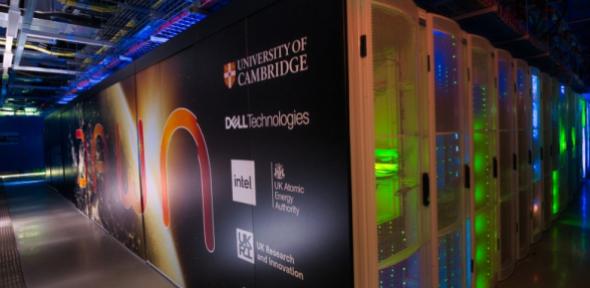
Senior Government minister the Rt Hon Pat McFadden MP visited Cambridge in February 2025 to explore the DAWN supercomputer, and met researchers including DAMTP’s Professor Carola-Bibiane Schönlieb to discuss ways in which AI can transform public services and healthcare.
UK Government minister the Rt Hon Pat McFadden MP, the Chancellor of the Duchy of Lancaster, was welcomed to Cambridge by the Vice-Chancellor, Professor Deborah Prentice. The visit started with a tour of DAWN, the fastest supercomputer in Europe.
Professor Prentice said: "I was very pleased to welcome the Minister to Cambridge to explore the rapidly-developing ways in which the University's research, and DAWN-powered AI, are driving improvements in everyday life. From improving diagnostics to speeding up planning applications, Cambridge AI research is producing positive impact in people's lives."
Transforming healthcare through AI
Following the tour of DAWN, the Minister visited Cambridge University Hospitals (CUH) to witness firsthand the practical applications of DAWN-powered AI. Mr McFadden met researchers and clinicians to explore two use cases of this technology in healthcare.
The first case study discussed the potential for AI in breast cancer diagnosis through the EDITH trial, a multicentre mammography study assessing AI’s role in enhancing cancer detection. This discussion coincided with the Government’s launch of the EDITH trial to tackle breast cancer on World Cancer Day.
The second case study was presented by Professor Carola-Bibiane Schönlieb from the Department of Applied Mathematics and Theoretical Physics and Dr Suthesh Sivapalaratnam (Barts Health NHS Trust and Chief Medical Officer for Blood Counts), who spoke to the Minister about the Blood Counts project. The interdisciplinary Blood Counts collaboration - one of the largest-scale applications yet of machine learning in medicine and healthcare - harnesses AI to revolutionise disease detection. The project provides an early warning system for infectious diseases, improving public health responses across the NHS. (Read more about the Blood Counts! project in our feature article Unlocking the potential of blood tests through AI)
The day concluded with a roundtable conversation with academics and clinicians around how the UK can harness the potential of AI to improve public services across various areas, ranging from healthcare to productivity and local government services.
The visit underscored Cambridge's pivotal role in harnessing AI for societal benefit and the potential for University research in cutting-edge technology to help public service transformation.
Mr McFadden said: "AI has the power to transform our public services, and the DAWN supercomputer is an excellent example of cutting-edge work being done right here in the UK, with an amazing partnership between Cambridge University and Addenbrooke's Hospital, improving medical diagnosis for patients.
"What's happening in Cambridge is really exciting, but we are only at the foothills of this technology and its potential to improve people's lives, which is why we are putting innovation at the forefront of our Plan for Change."
This article is adapted from a news release published by the University of Cambridge.
Image credit: Joe Bishop
